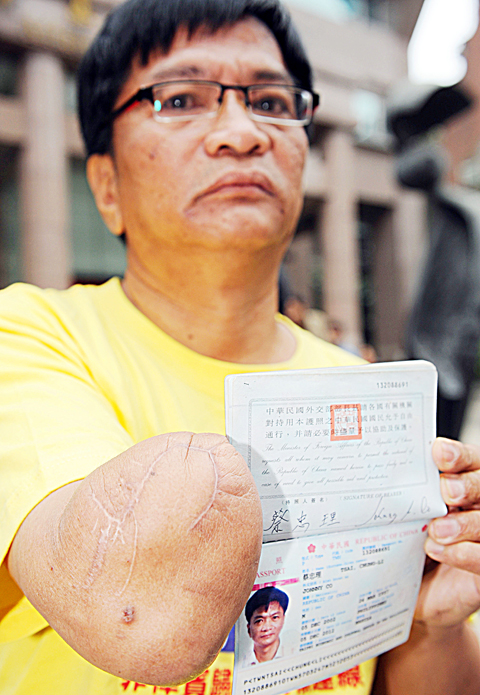Dozens of activists yesterday gathered in front of the Council of Labor Affairs (CLA) building to protest against the government’s failure to protect the rights and benefits of about 2,000 “Republic of China (ROC) nationals without citizenship” living in Taiwan.
Tsai Chung-li (蔡忠理), an ROC national without citizenship, has lived and worked in Taiwan for more than 10 years. He is one of the many people born in the Philippines who hold Taiwanese passports but do not have legal residence status in Taiwan.
Workers such as Tsai, although in possession of ROC passports, are denied legal residence status because the government does not view them as “Taiwanese” and therefore denies them national ID cards. They are mostly born and raised in the Philippines, but hold ROC passports because their parents are ethnic Chinese.

PHOTO: WANG MIN-WEI, TAIPEI TIMES
Tsai’s arm was severed in November last year when it was pulled into a machine at a factory where he worked. However, because his employer did not insure the company’s workers as dictated by labor regulations, Tsai said he could not receive labor insurance compensation and occupational injury compensation that he would have received as a citizen.
Although labor regulations protect such uninsured workers by entitling them to apply for compensation in the event they become disabled from an occupational injury, Tsai’s legal status means he is denied such protection.
“It has been a year since my injury, but I have not received NT$1 in compensation for my arm,” said Tsai, adding that he hoped the labor insurance bureau would take a good look at the problems facing workers like him.
Lorna Kung (龔尤倩), executive director of the Scalabrini International Migration Network in Taiwan and consultant to the Taiwan International Workers Association (TIWA), said there were about 2,000 ROC nationals without citizenship living in Taiwan. Because they are denied legal status to live in Taiwan, they must leave the country for at least one day every six months to renew their visas.
The association urged the government to extend labor rights and benefits to such nationals.
The council said officials would look into the matter and process Tsai’s case as soon as possible. It also said all employers must insure their workers under the national labor insurance plan, regardless of citizenship.

Taiwan is to commence mass production of the Tien Kung (天弓, “Sky Bow”) III, IV and V missiles by the second quarter of this year if the legislature approves the government’s NT$1.25 trillion (US$39.78 billion) special defense budget, an official said yesterday. Commenting on condition of anonymity, a defense official with knowledge of the matter said that the advanced systems are expected to provide crucial capabilities against ballistic and cruise missiles for the proposed “T-Dome,” an advanced, multi-layered air defense network. The Tien Kung III is an air defense missile with a maximum interception altitude of 35km. The Tien Kung IV and V

The disruption of 941 flights in and out of Taiwan due to China’s large-scale military exercises was no accident, but rather the result of a “quasi-blockade” used to simulate creating the air and sea routes needed for an amphibious landing, a military expert said. The disruptions occurred on Tuesday and lasted about 10 hours as China conducted live-fire drills in the Taiwan Strait. The Civil Aviation Administration (CAA) said the exercises affected 857 international flights and 84 domestic flights, affecting more than 100,000 travelers. Su Tzu-yun (蘇紫雲), a research fellow at the government-sponsored Institute for National Defense and Security Research, said the air

A strong continental cold air mass is to bring pollutants to Taiwan from tomorrow, the Ministry of Environment said today, as it issued an “orange” air quality alert for most of the country. All of Taiwan except for Hualien and Taitung counties is to be under an “orange” air quality alert tomorrow, indicating air quality that is unhealthy for sensitive groups. In China, areas from Shandong to Shanghai have been enveloped in haze since Saturday, the ministry said in a news release. Yesterday, hourly concentrations of PM2.5 in these areas ranged from 65 to 160 micrograms per cubic meter (mg/m³), and pollutants were

Taiwan’s armed forces have established response protocols for a wide range of sudden contingencies, including the “Wan Chun Plan” to protect the head of state, the Ministry of Defense (MND) said today. After US President Donald Trump on Saturday launched a series of airstrikes in Venezuela and kidnapped Venezuelan President Nicolas Maduro, concerns have been raised as to whether China would launch a similar “decapitation strike” on Taiwan. The armed forces regularly coordinate with relevant agencies and practice drills to ensure preparedness for a wide range of scenarios, Vice Minister of National Defense Hsu Szu-chien (徐斯儉) told reporters before a